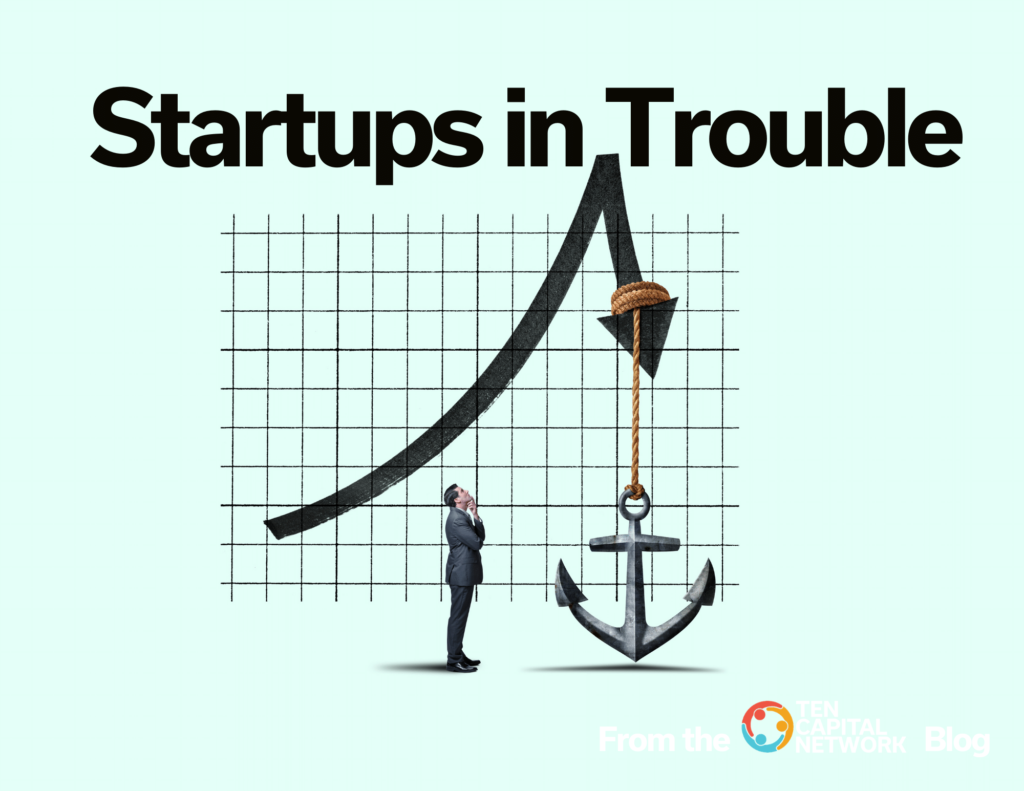3 min read What are some warning signs of startups in trouble?
Often, startups will find themselves falling into unfavorable business conditions. Whether you are on the side of the startup or an investor, it is essential to recognize when a startup is in trouble and know how to manage it best.
Warning Signs
As an investor, you can often see warning signs of trouble in small ways before becoming full-blown in the startup.
The following are warning signs to look out for:
- The CFO quits unexpectedly.
- The paychecks to employees bounce, and it’s called an “accounting error.”
- Information from the CEO becomes limited, and they don’t return phone calls.
- Administrative people are let go without explanation.
- They missed revenue expectations- again.
- Founders leave the company without six months’ notice.
When you notice things seem out of the ordinary, it’s best to contact the team and ask for a straight-up answer.
Managing In A Downturn
When running a startup, there will be upturns and downturns. Managing a downturn takes a different approach than the upturns. In an upturn, it’s about increasing your top line, hiring new employees, and increasing market share. In a downturn, it’s about keeping the lights on, getting more productivity with fewer team members, and living to see another day.
Here are some things you can focus on doing:
- Seek advice and guidance from others such as investors, mentors, and CEOs.
- Don’t delude yourself into thinking it’s better than it is, or it will turn around soon. Acknowledge that it’s a bad situation and take action.
- Get a little aggressive with the steps that you must take.
- Reconfirm your commitment to your company and mission statement. You’ll most likely need to take on extra responsibilities, which will require more of you.
- Downturns bring new market opportunities, so start looking for them.
Common Startup Mistakes
Startups make many mistakes. Here are two common ones to avoid:
- Thinking you must have the perfect product before you talk with anyone; including customers.
Many startups go into development mode until they have their first product and then launch it to the world. Often with a thud. Involve customers at every step of the process. Customers should come before the product. Not after. - Hiring the wrong people. Many startups hire people they know rather than people with skills. Some hire with the notion that the candidate ‘needs a job’ rather than ‘they have the skill.’
Other hiring mistakes include:
- Hiring B people instead of A people.
- Hiring someone to fill a specific position without fit to culture of the company.
- Hiring someone for work that is not yet defined or funded.
The Must-Dos
In running a startup, it’s essential to focus on the essentials of the business. In your strategy planning, identify the Must-dos.
The Must-Dos have to get done. Beware of the Nice-to-Haves. If you hear yourself saying, “Wouldn’t it be nice if we did this?” it most likely will be taking you away from the essentials.
Here’s how to protect your time in the business:
- The first rule is to say no, and often, freeing up time for the Must-Dos.
- Watch out for commitments that are recurring, such as meetings that happen every week. If you can’t say no entirely to a commitment, then bound your commitments.
- Don’t sign up with open-ended projects that aren’t well defined. Focus your efforts on the core aspects of the project, such as building the processes and enabling others to carry the project forward.
- Skew to the activities that can grow, then scale.
Look for activities that directly contribute to the Must-Dos and focus on those.
The Value of Confidence
An entrepreneur raising funding must demonstrate confidence. Investors will look for someone who has faith in their plan, their team, and themselves.
Often, entrepreneurs fake confidence and come off looking cocky. This is unfounded confidence. True confidence inspires others and persuades them to support the company. Investors look for this in the founder as he must attract others to join the team and customers and partners.
Founders who inspire others have a greater chance of success at the early stage of a startup.
Read more in the TEN Capital eGuide: https://www.startupfundingespresso.com/negotiations-and-valuations/

Hall T. Martin is the founder and CEO of the TEN Capital Network. TEN Capital has been connecting startups with investors for over ten years. You can connect with Hall about fundraising, business growth, and emerging technologies via LinkedIn or email: hallmartin@tencapital.group





